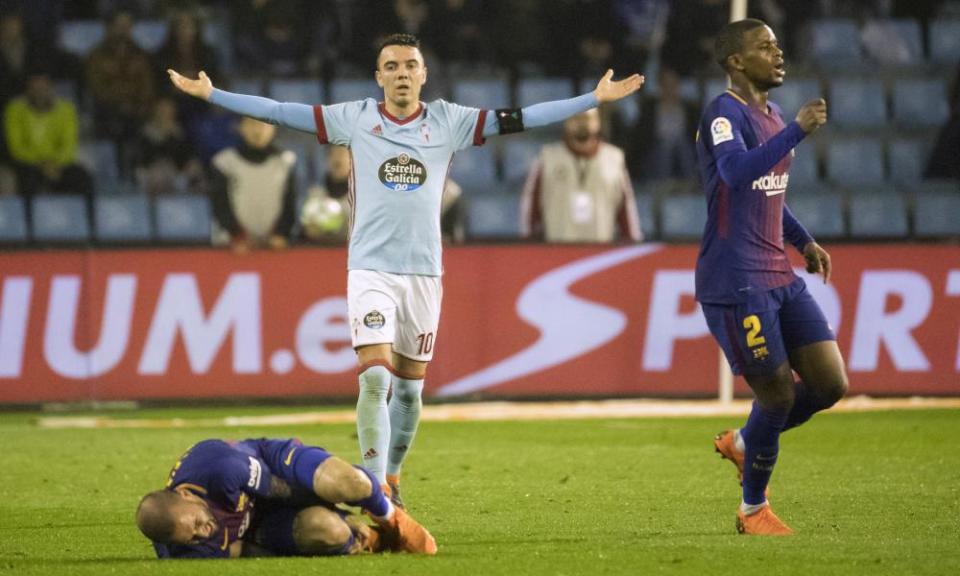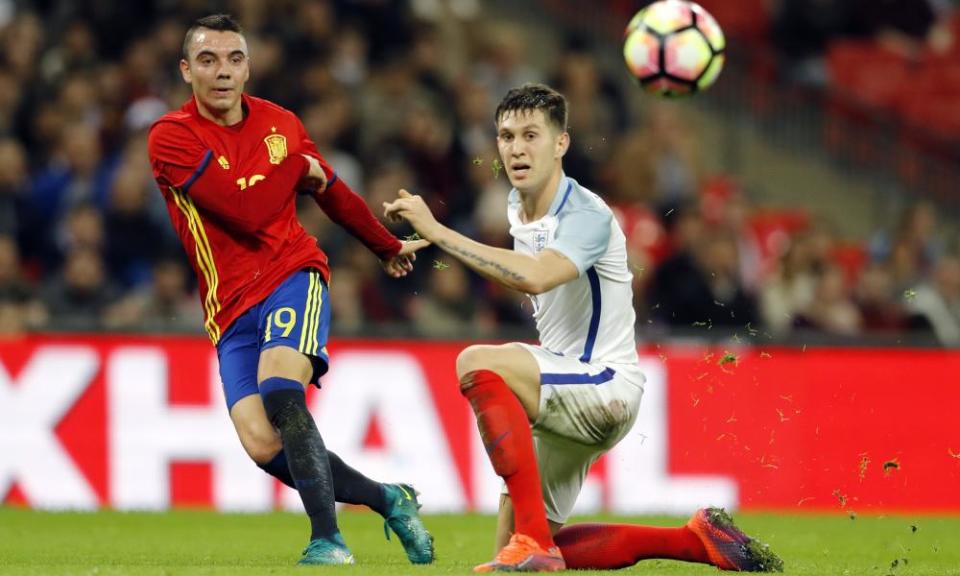'Monumental' Iago Aspas shows World Cup credentials against Barcelona

Every day when the tide goes out on the beach of Moaña where the Atlantic reaches deep into Galicia, María joins the groups of women carrying buckets and wearing wellington boots, making their way across the wet flats.
Together they collect oysters and mussels by hand, loading them up to be taken to the market in the town. It is hard work and María’s son, 30 now, has suggested she leave it all behind but it is what she does and what she has always done; what she, like many women in Galicia, is. So, there she is each day with her friends, heading across the sand. He, meanwhile, climbs into his old VW Golf, a bit battered now, noisy too, and drives over the Rande bridge across the water to Vigo, where he plays football.
“It’s my life,” María told Galician TV. Football is his; it is all of theirs. Only one of the Aspas brothers doesn’t play, and an uncle and two cousins play as well, as did their dad, although not at their level. Urbe, like his father, is a goalkeeper while Jonathan is at Pro Piacenza, a midfielder who played for Spain from U15 to U20 level but never made a senior appearance. His younger brother did, although he had to wait until he was 29, and then he scored on his debut – at Wembley. He is a striker for Celta de Vigo and Spain and the question now is not whether or not he travels to Russia this summer, it is whether he starts. And perhaps he should. Because while this has been said before, it’s worth saying again: Iago Aspas is very, very good at football.
He always was, even if he couldn’t always show it, just maybe not this good. Some have even dared ask if he might be the best player Celta have had, better than Alexander Mostovoi, Aspas’s idol and the subject of this work of art. Few have been so popular, that’s for sure.
Iago was 12 when a 16-year-old Jonathan made his debut for Celta and eight the day he first turned up for trials at the club, which was a problem: they had to be at least nine. So, they lied and never before have a club been happier to be conned. He has left twice – as a kid he was briefly released to a local team called Rapido Bouzas and then there were the disappointing spells at Liverpool and Sevilla – but it is 20 years there now. And if it happened late for a player who didn’t make a first division debut until he was 25 and had to come go away and come back to fully find himself, it has happened now. He is better than ever.
Javier Maté, the man credited with finding him, told El Mundo: “No kid lived football like him; he could tell you the goalkeepers of Pakistan.”
Above all, though, he knows his club. “At Balaídos, he even knows where the seagulls shit,” Maté said. A Celta fan who once said that he wouldn’t even have a girlfriend who was a Deportivo supporter, he has occasionally lost his head and it has occasionally cost him. At youth level, he was running at a red card every fortnight, some joked. It was an exaggeration but there was something in it. He missed what would have been his first call up to the senior side because he was sent off for the B team. The game he missed was a derby and he was heartbroken. In another meeting with Deportivo, the club’s first for six years, he was sent off, veteran striker Mario Bermejo declaring: “When you go to bed with children, you wake up covered in piss.” Despite that, he became an idol. Or perhaps it was because of that. When he went, they needed him to go; when he came back, they welcomed him home. The return was good for him, opportunities afforded that he had not had in Seville or on Merseyside, and the experience away had helped too: there was a lesson there and Moaña was his place, Balaídos too.
He matured, although he never entirely left that kid behind: Aspas plays the way fans like to think they would: wild, frantic, desperate to win. He scored twice on his debut as a 21-year-old rescuing them from probable relegation to Spain’s regionalised, four-division Segunda B, and maybe even from disappearance, and 23 times in the second division to return them to primera. Since then, he has scored 12, 13, 19, and now 20. No Celta player has got 20 or more for 60 years. Only three others have ever done it.
But it wasn’t just that Iago Aspas scored on Tuesday night, clinching a 2-2 draw for Celta against Barcelona and taking him to 20 this season – the top scoring Spaniard for a second year in a row. It was that he did everything else. Apart from take corners.
“Tin chest” one former team-mate calls him and there’s something in that: small sure, but chest puffed out, taking on everyone and everything, a touch of the Scrappy Doo about him. A superb player and a yappy one too: pushy, fouly and confrontational as well as talented, quick-witted and clever with the ball. At times it is unpleasant. Worse, much worse, this season Jefferson Lerma accused him of racially abusing him, which Aspas denied (and, with sad inevitability, it pretty much ended there).
Paco Herrera his former manager calls him a “street player”; Eduardo Berizzo describes him as a player of “jugada propia” – someone who makes his own moves. But he makes everyone else’s too. Tuesday night was another demonstration.
“He’s a top player and I’m lucky to be able to enjoy watching him every Sunday,” said the Celta sporting director Felipe Miñambres. “A magisterial lesson,” El Faro de Vigo called it. Watching on TV, Alavés’s Ibai Gómez clapped: “What a player!” Ernesto Valverde described him as “extraordinary”.
Michu, who played with Aspas on his debut, tweeted a picture of a magician’s hat, and the words: “One more time.” And that was the point: this was no one off, but a recurring theme. Even if it was Barcelona’s B team – of the starters only Marc Andre Ter Stegen, who rescued them repeatedly, is a regular – and even if it was only a draw, Aspas was right to insist that Celta had deserved to win. This has also happened against the A Team, more than once. It was also the confirmation of a colossal season, the excitement it engenders, the sense that Spain may have a striker who suits their style, the man who came on, scored and provided a assist in their last game.
“Barcelona can’t cope with Aspas,” Marca wrote, describing him as “monumental”, a player “capable of carrying an entire team in his arms”.
“There are no adjectives to describe him any more,” wrote A La Contra. He was everywhere and everything. He scored a late equaliser – with his hand – and then provided the perfect pass for what should have been the winner. He got a yellow card and got fouled for a red, Sergi Roberto literally grabbing him as he raced away. He ran and passed and shot and by the end of it, he could barely walk. Which is pretty much the way he ends most games, but this was different. “I felt something,” he admitted. Tests showed a tear that will keep him out for two weeks.
Celta will miss him as they chase their last, remote chances of a European place. More, perhaps, than any other team would miss any other player.

Aspas has scored 20 of their 52 goals this season and assisted five. At 38.46%, only Cristhian Stuani at Girona (17 of 44, 38.63%) and Gerard Moreno at Espanyol (12 of 26, 46.15%) have scored a bigger proportion. Add assists and, at 48.07%, only Leo Messi (29 goals and 12 assists of 83 goals, 49.39%) has directly had a hand in a bigger percentage. Only Messi, Luis Suárez and Ronaldo have scored more. No forward except Messi has completed more passes and only Messi has created more chances (66 to 78). Only seven players have completed more dribbles and he has more than Joaquín, Iniesta, Ronaldo or Isco.
Then there’s what he does to everyone else. “I prefer to talk about the collective but it’s true that Iago is a leader; he’s the one that decides,” said the Celta coach Juan Carlos Unzué. “He’s the first to pull on his overalls and get to work, to transmit that attitude, and everyone else follows him.” No wonder only two outfield players (Moreno and Johnny Otto) have played more minutes in Spain this season. Aspas has missed just one game – through suspension, of course.
Now, he will miss two more. But Aspas will be back, heading over the bridge from Moaña just in time for the derby with Depor.
Talking points
“We’ll keep fighting to the very end,” said Lucas Pérez after Depor drew 0-0 against Sevilla in a game both sides might have won. On the final day, Depor’s fate might be in the hands of Celta, who face Levante. “I hope they can do us a favour,” Lucas said, perhaps a little optimistically.
Barcelona fielded a side with not one player from the youth system in it. Despite it being pretty much a B team. “It’s circumstantial,” Valverde said, when the word might actually be systemic.
Betis, the team who “can’t defend”, have conceded just three goals in eight games since that 5-3 with Madrid. on Thursday, they face Las Palmas. Win and it will be six in a row – for the first time in 58 years.
Asked about the Champions League after Real’s draw with Athletic Bilbao on Wednesday night, Zinedine Zidane said: “Let’s talk about the league, which has been our problem a bit this year.” It means that they have dropped points in 13 league matches this season. Across all competitions, they have failed to win 12 times at the Bernabéu.
“We have done few things to make the fans happy, so I hope we can at least end the season with a good taste in the mouth,” said Cuco Ziganda. It was the first time Athletic had avoided defeat at the Bernabéu for 12 years, but it didn’t wash away the last eight months. “We know it hasn’t been a good year,” he said.
And Eibar remain a first division club, mathematically safe with five weeks to go. Which doesn’t sound like that big a deal, but it really is.
Deportivo 0–0 Sevilla, Celta 2–2 Barcelona, Villarreal 2–1 Leganés, Valencia 1–2 Getafe, Espanyol 0–1 Eibar, Madrid 1–1 Athletic. Tonight: Alavés-Girona, Real Sociedad-Atlético, Betis-Las Palmas, Levante-Málaga.

 Yahoo Sport
Yahoo Sport 





































